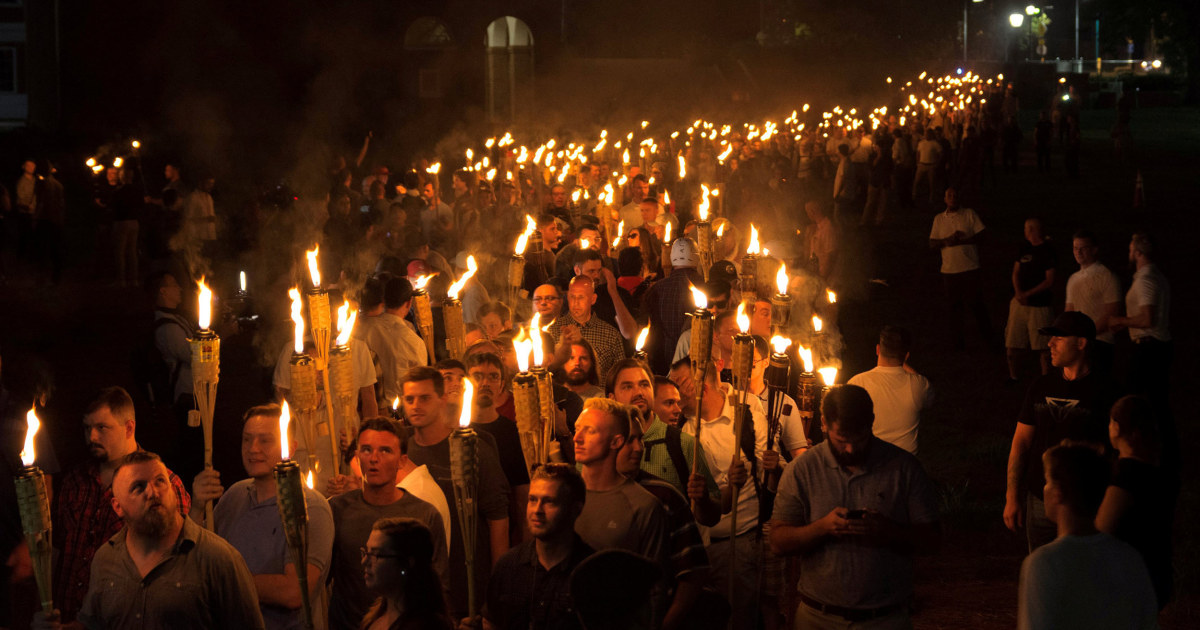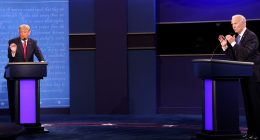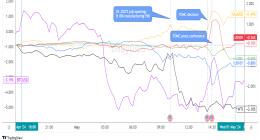
CHARLOTTESVILLE, Va. — Four years after a group of neo-Nazis and white supremacists converged on this sleepy college town with deadly results, opening arguments got underway Thursday in a civil lawsuit accusing them of a violent conspiracy — a case with major implications for similar legal efforts against former President Donald Trump and others accused of inspiring the Capitol riot.
“This is a case about violence and intimidation that was planned for months,” Karen Dunn, a lead lawyer for the plaintiffs, told the jury as the trial began over the August 2017 “Unite the Right” rally.
Dunn immediately began playing video of one of the event’s indelible scenes: far-right marchers carrying torches and chanting, “Jews will not replace us.”
But the defendants in this case aren’t on trial for vile slogans — they are accused of conspiring to incite and carry out violence that injured those suing. That violence included the act of James Alex Fields, who is serving life in prison after being convicted of intentionally driving his car into a crowd, killing 32-year-old Heather Heyer.
The plaintiffs allege that Fields’ crime was an outgrowth of a conspiracy that included those who planned and organized the event, which was billed as a protest over the removal of a statue of the Confederate Gen. Robert E. Lee.
“There is one thing about this case that should be made crystal-clear at the outset — the violence in Charlottesville was no accident,” the lawsuit says. “Under the pretext of a ‘rally,’ which they termed ‘Unite the Right,’ Defendants spent months carefully coordinating their efforts, on the internet and in person.”
To make their case, the plaintiffs are relying on reams of evidence, including message traffic among the participants, some of which was obtained when a trove of documents was leaked from the gaming site Discord. In exchanges moderated by two of the defendants, the lawsuit alleges, there were multiple exhortations to violence, including:
● “I’m ready to crack skulls.”
● “If you don’t have a flame thrower you’re wrong.”
● “Studies show 999/1000 n—— and feminists f— right off when faced with pepper spray.”
● “[E]ven if you aren’t expecting violence you should prepare for it.”
● “Let there be no mistake — these two side have irreconciable [sic] differences that will never reach compromise — the only question is the level of conflict to decide the victor.”
“We’ve sued over 20 defendants, including individuals and affiliate organizations,” another lead plaintiff attorney, Roberta Kaplan, told NBC News in an interview before court. “And the point of our case is that these are the groups who conspired to commit this violence in Charlottesville, then committed the violence and then celebrated the violence after it had occurred.”
The defendants argue that their online comments amounted to protected free speech, and that there is no evidence of a violent conspiracy. But some acknowledge that the case will be hard for them to win.
“I think this case has largely been driven by emotion and an understandable desire for vengeance,” Edward ReBrook, a lawyer for the National Socialist Movement, told NBC News. “So if we can overcome that, and we could go on purely what the evidence says, then I think that this case will go for the defense. But I’m not especially optimistic.”
Funded by Integrity First for America, a civil rights nonprofit, the lawsuit is designed to impose financial costs on far-right groups, and to some extent it already has succeeded. Some of the groups behind the rally have dissolved, and one of the better known defendants, Richard Spencer, has called the lawsuit “financially crippling.” He is acting as his own advocate in court.
But perhaps the most significant implication of the case is its relevance to the Jan. 6 Capitol riot. The lawsuit was brought under an 1871 law designed to protect black people from the Klu Klux Klan and other hate groups that used “force, intimidation, or threat” to deny civil rights.
A number of lawsuits have been brought under the same law accusing Trump and some of his associates, including Steve Bannon and Rudy Giuliani, of inciting the Jan. 6 violence. The plaintiffs include Capitol police officers and members of Congress.
“At a moment of rising extremism, this case makes clear that violent hate won’t go unanswered — that there must be accountability and justice,” said Amy Spitalnick, executive director of Integrity First for America. “What is crystal clear is that Unite the Right wasn’t an isolated incident. Rather, it was a harbinger of the cycle of extremism that’s followed in which each attack has inspired the next and this sort of violent hate has become increasingly normalized.”
The Charlottesville case, she said, “can help break that cycle by illustrating the very real financial, operational, and legal consequences for extremism.”
Source: | This article originally belongs to Nbcnews.com










